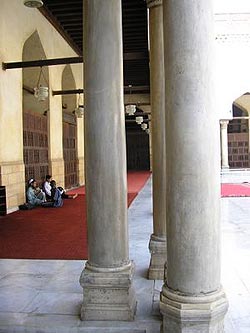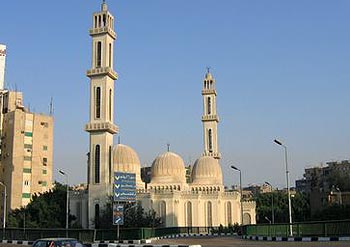CAIRO - When I arrived in Egypt, among the first things that I noticed were the voices over loudspeakers calling people to prayer throughout the day.
In the '70s, when Sadat was president, he ordered the mosques around the city to put in the loudspeakers so that everyone could hear the call and be reminded to perform the five daily prayers required of Sunni Muslims. The prayers are supposed to be said at specific times, based on sunrise and sunset, but the mosques around my apartment don't seem to have the system down - or else they're all working from different clocks. This means that instead of hearing the call to prayer five times a day, Kelly and I hear it about 20 times, as each of the four or five nearby mosques sound out within a few minutes of each other.
After a few days, we were able to distinguish between the mosques quite well by their different voices and different times. The one closest to us - and therefore loudest - has the nicest call, and the melody used by the muezzin (the caller) often gets stuck in my head. There is another one a bit further away that is always late and rushes through one section of the call. Kelly and I had an argument going over whether the calls were taped or live - I preferred to think of them as live. For a while, Kelly had me convinced that they were, in fact, taped, but over the past few days we've heard a lot of variation in the voices and I think Kelly has finally come around to my opinion.
 People studying at al-Azhar mosque. (Photo taken by Pamila's friend Kelly) |
The calls to prayer are just one aspect of Islam that plays a part in my daily life in Cairo. It has amazed me, as I examined the phenomenon here that at first seemed strange, how much the majority religion affects the lives of all the people in a society, not just those who practice their religion inside the mosques (or the church), but everyone. However, these things that seemed so strange and different - the calls to prayer, the number of women wearing a hijab (traditional headscarf), or niqab (which masks the entire face, leaving only the eyes uncovered), the requisite copy of the Quran on the dashboard of almost every taxi - each have a corresponding phenomenon at home that I was never able to see clearly until I was outside looking in.
I started thinking about religion during my trip to Alexandria. Until my arrival in Egypt, I had never stayed in a hotel where there wasn't a copy of the Bible in the nightstand (even in China!). I only thought to look for one because there was another item present in the room that I had never seen before: a card pointing toward Mecca, so that guests knew the exact direction in which to pray.
Although my parents were practicing Buddhists when I was born, I have spent most of my life in what I thought was a religious vacuum. I never attended any kind of temple or church, I didn't spend time with any religious relatives, and most of my friends came from non-practicing families similar to mine. Because of my experience with it, I had always considered American society to be fairly secular. However, living now in a place where Christianity is not the religion of the majority, and not the religion of the founders of the country, I am beginning to see just how much I took aspects of Christianity for granted in America . and how Islam affects Egyptian society in similar ways.
So, I'm beginning to view these cultural differences on a sliding scale: Americans may not have five calls to prayer each day, but if you live near a church, you might hear at least one call to prayer each week when the church bells ring on Sunday morning. We do not have a tradition that requires women to cover their hair, but we do require that women cover their breasts, while men may go bare-chested. And although the Quran on a dashboard might seem strange to me, I wouldn't think twice if I saw a crucifix or a picture of the Virgin Mary in a car. That seems perfectly normal.
I wanted to write this dispatch to say that although Islam and the symbols of Islam are a part of my daily life here, it is not overwhelmingly different from the presence of the majority religion in the United States. It is a little more obvious here, but then again, there is also a larger majority here. From the outside looking in, the two cultures are not as different as it might seem from the inside looking out.
* * *
Heba, my amiyya teacher, attended a conference in England the weekend that the first London bombings happened. She flew out of Cairo on Thursday, July 7, around 6:30 a.m., and touched down in Heathrow Airport at 1 p.m. The passengers were stuck on the plane for over an hour, not knowing what was wrong - not knowing anything was wrong really - and were finally shuffled out into an airport crowded with soldiers carrying big guns. She said she had tons of text messages on her phone - her mother, her children, our program director - all asking if she was OK, but not indicating why they were so concerned.
She didn't actually find out what had happened until an hour or so later when she saw the TV news as she was buying a train ticket. Suddenly, all the soldiers and mean looks made sense: she realized that she had wandered into an area that was not going to be very Arab friendly.
Heba said she cried a lot that weekend. People were mean to her: while she sat on a bench reading a story in Arabic, people came up and cursed her - telling her to keep her bag close to her, so that "when it blew up she would be the first one killed." This happened twice. Even her colleagues at the conference hurt her by joking, "You came from Egypt and brought the bombs with you." She laughed with them, but it still upset her. She doesn't want to be known as a terrorist, even as a joke. I can't blame her.
I didn't initially mention Thursday's bad news because it didn't touch me directly, but watching Heba tear up in class as she recalled that weekend, I figured it was necessary to talk about it. Mostly I want to say again: Not all Muslims are terrorists.
Not "all" anything are something. Most Almost every person I have met here in Cairo has been nice, kind, and welcoming. No one has tried to force their political views on me, no one has tried to convert me, and no one has tried to hurt me because I am a Westerner.
I am sad to hear that those same courtesies were not extended to Heba in England - no matter how serious the situation surrounding her.
—Pamila
Pamila Pengra graduated from UC Berkeley in May 2005 with a B.A. in linguistics. She is studying Arabic in Cairo on a CASA fellowship.





